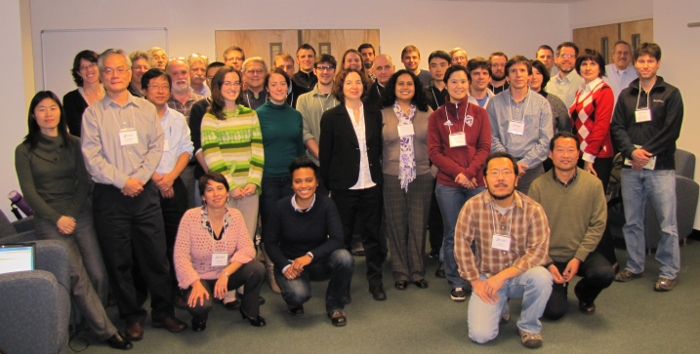| Description | Participants | Agenda | Summary | Posters | Products |
|---|
NIMBioS Investigative Workshop
Disturbance Regimes and Climate-Carbon Feedback

Topic: Integration of disturbance ecology and biogeochemistry to predict future dynamics of terrestrial carbon cycle under global change
Meeting dates: February 13-15, 2012
Organizers:
Maria Leite
(Mathematics, Univ. of Toledo)
Yiqi Luo
(Ecology, Univ. of Oklahoma at Norman; Director, EcoLab)
Objectives: Disturbances have been recognized as a key factor affecting terrestrial biogeochemical processes but can be easily misinterpreted without considering the context of disturbance regimes. Many studies have been conducted to quantify impacts of individual disturbance events on ecosystem carbon processes. In general, one disturbance event, such as wildfire, usually triggers release of a large amount of carbon and then follows by recovery processes. It is important to recognize that any disturbance events happen in a context of disturbance regime in a region. If the disturbance regime does not change over time in a region (i.e. stationary), recovery processes after one disturbance event result in net carbon uptake that can fully compensate the carbon loss triggered by the disturbance event, leading to no net change in carbon balance over time. Similarly over space, the carbon loss triggered by the disturbance event in one area can be fully compensated by carbon gain by recovery in other areas in a region if regional disturbance regimes are stationary. Thus, disturbance impacts on biogeochemical cycles have to be interpreted in the context of disturbance regimes and their responses to global change.
Disturbance regimes can usually be characterized by disturbance frequency, severity, and extensity, and differ in different regions of the world. So far, the quantitative relationship between carbon-climate feedback and disturbance regimes has not yet been carefully explored. Climate change likely alters disturbance regimes (i.e. nonstationary). The nonstationary disturbance regimes trigger either net carbon releases from or uptake by terrestrial ecosystems, feeding back to climate change. Mathematical models are needed to quantify stationarity of disturbance regimes and their feedback to global carbon cycles and climate change. This investigative workshop will bring together disturbance ecologists, biogeochemists, mathematicians, statisticians, and computer scientists to discuss various issues related to integration of disturbance ecology with biogeochemistry using mathematical and statistical approaches. The workshop will synthesize state-of-the-art information and identify future directions in the interface areas of disturbance ecology and biogeochemistry. It is anticipated that the workshop will lead to a NIMBioS Working Group to tackle more focused issues in this interface area.
Central Theme. Development of mathematical models that integrate disturbance ecology with biogeochemistry so as to predict future changes in disturbance regimes and their influences on carbon-climate feedback.
Evaluation report (PDF)

Products
Publications
Hritonenko N, Yatsenko YU. 2012. Bang-bang, impulse, and sustainable harvesting in age-structured populations. Journal of Biological Systems, 20(2): 133. [Online]
Vargas R. 2012. How a hurricane disturbance influences extreme CO2 fluxes and variance in a tropical forest. Environmental Research Letters, 7: 035704. [Online]
Presentations
Hritonenko N. February 2013. Sustainable development in biological and environmental systems. TAMU, College Station, PVAMU, Prairie View, NSF-UBM-Colloquium.
Hritonenko N, Yatsenko YU. May - June 2012. Generalized functions in qualitative analysis of population control problems. 12th Viennese Workshop on Optimal Control, Dynamic Games and Nonlinear Dynamics, Vienna, Austria.
Hritonenko N, Yatsenko YU, Goetz R. January 2012. The environmental impact on sustainable forest management. American Mathematical Society, Boston, MA.
NIMBioS Investigative Workshops focus on broad topics or a set of related topics, summarizing/synthesizing the state of the art and identifying future directions. Workshops have up to 35 participants. Organizers and key invited researchers make up half the participants; the remaining participants are filled through open application from the scientific community. Open applicants selected to attend are notified by NIMBioS within two weeks of the application deadline. Investigative Workshops have the potential for leading to one or more future Working Groups. Individuals with a strong interest in the topic, including post-docs and graduate students, are encouraged to apply. If needed, NIMBioS can provide support (travel, meals, lodging) for Workshop attendees, whether from a non-profit or for-profit organization.
A goal of NIMBioS is to enhance the cadre of researchers capable of interdisciplinary efforts across mathematics and biology. As part of this goal, NIMBioS is committed to promoting diversity in all its activities. Diversity is considered in all its aspects, social and scientific, including gender, ethnicity, scientific field, career stage, geography and type of home institution. Questions regarding diversity issues should be directed to diversity@nimbios.org. You can read more about our Diversity Plan on our NIMBioS Policies web page. The NIMBioS building is fully handicapped accessible.
NIMBioS
1122 Volunteer Blvd., Suite 106
University of Tennessee
Knoxville,
TN 37996-3410
PH: (865) 974-9334
FAX: (865) 974-9461
Contact NIMBioS


